Exploring Business Law: Sources, Government Role, Impact of Key Acts
VerifiedAdded on 2023/06/16
|9
|1994
|73
Report
AI Summary
This report provides an overview of the sources of law, including legislation, common law, judicial precedent, and conventional law. It examines the role of the government in law-making, detailing the stages a bill goes through to become an Act of Parliament, such as first reading, second reading, committee stage, report stage, third reading, and royal assessment. The report also explores the impact of the Company Act 2006 and the Employment Act on local businesses, highlighting how these acts aim to modernize company law, protect shareholder rights, and safeguard the rights and liabilities of employers and employees. The report concludes that businesses must adhere to these laws to operate effectively and ethically within the legal framework.
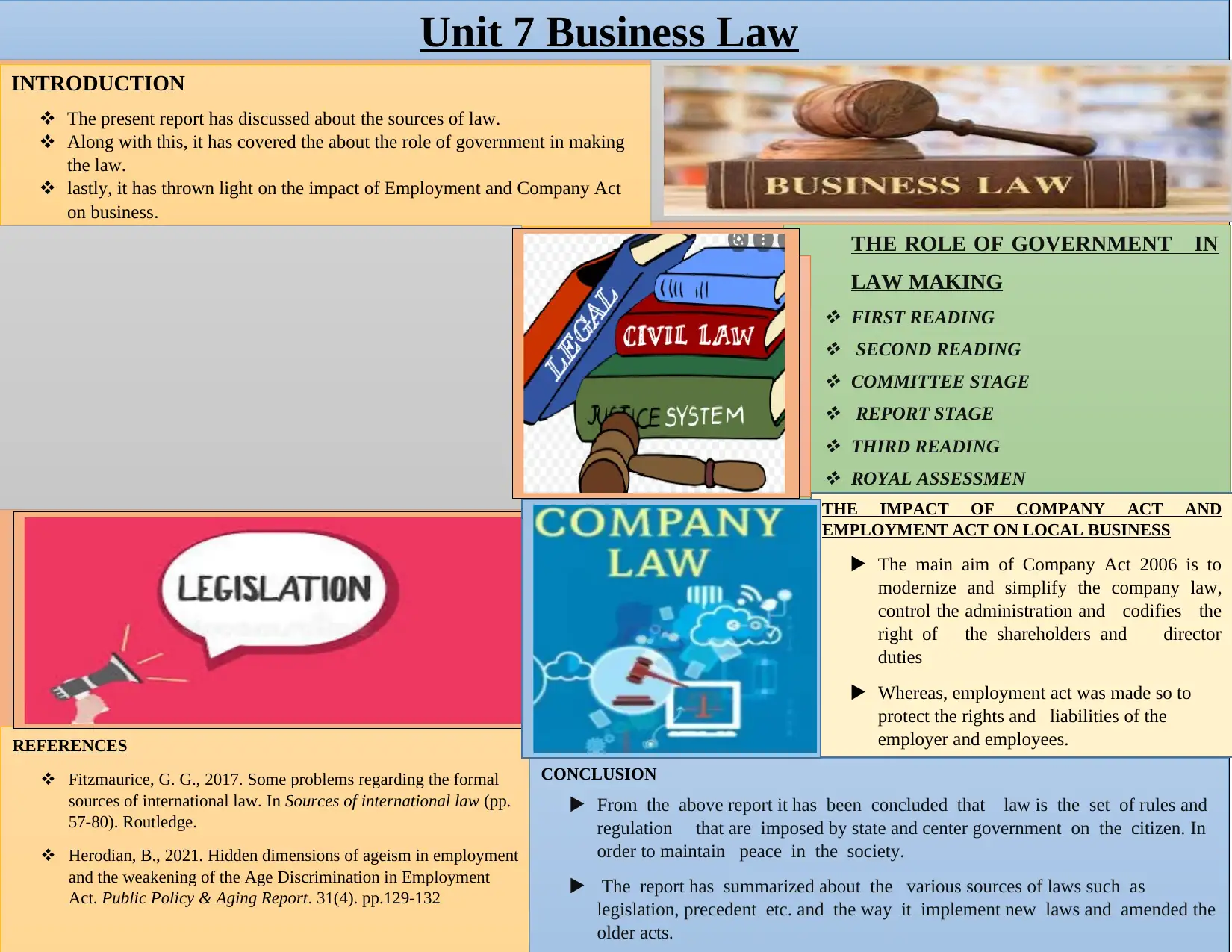
vvv
Unit 7 Business Law
INTRODUCTION
The present report has discussed about the sources of law.
Along with this, it has covered the about the role of government in making
the law.
lastly, it has thrown light on the impact of Employment and Company Act
on business.
DIFFERENT SOURCES OF LAW
LEGISLATION
COMMON LAW
JUDICIAL PRECEDENT
CONVENTIONAL LAW
THE ROLE OF GOVERNMENT IN
LAW MAKING
FIRST READING
SECOND READING
COMMITTEE STAGE
REPORT STAGE
THIRD READING
ROYAL ASSESSMEN
REFERENCES
Fitzmaurice, G. G., 2017. Some problems regarding the formal
sources of international law. In Sources of international law (pp.
57-80). Routledge.
Herodian, B., 2021. Hidden dimensions of ageism in employment
and the weakening of the Age Discrimination in Employment
Act. Public Policy & Aging Report. 31(4). pp.129-132
CONCLUSION
From the above report it has been concluded that law is the set of rules and
regulation that are imposed by state and center government on the citizen. In
order to maintain peace in the society.
The report has summarized about the various sources of laws such as
legislation, precedent etc. and the way it implement new laws and amended the
older acts.
THE IMPACT OF COMPANY ACT AND
EMPLOYMENT ACT ON LOCAL BUSINESS
The main aim of Company Act 2006 is to
modernize and simplify the company law,
control the administration and codifies the
right of the shareholders and director
duties
Whereas, employment act was made so to
protect the rights and liabilities of the
employer and employees.
Unit 7 Business Law
INTRODUCTION
The present report has discussed about the sources of law.
Along with this, it has covered the about the role of government in making
the law.
lastly, it has thrown light on the impact of Employment and Company Act
on business.
DIFFERENT SOURCES OF LAW
LEGISLATION
COMMON LAW
JUDICIAL PRECEDENT
CONVENTIONAL LAW
THE ROLE OF GOVERNMENT IN
LAW MAKING
FIRST READING
SECOND READING
COMMITTEE STAGE
REPORT STAGE
THIRD READING
ROYAL ASSESSMEN
REFERENCES
Fitzmaurice, G. G., 2017. Some problems regarding the formal
sources of international law. In Sources of international law (pp.
57-80). Routledge.
Herodian, B., 2021. Hidden dimensions of ageism in employment
and the weakening of the Age Discrimination in Employment
Act. Public Policy & Aging Report. 31(4). pp.129-132
CONCLUSION
From the above report it has been concluded that law is the set of rules and
regulation that are imposed by state and center government on the citizen. In
order to maintain peace in the society.
The report has summarized about the various sources of laws such as
legislation, precedent etc. and the way it implement new laws and amended the
older acts.
THE IMPACT OF COMPANY ACT AND
EMPLOYMENT ACT ON LOCAL BUSINESS
The main aim of Company Act 2006 is to
modernize and simplify the company law,
control the administration and codifies the
right of the shareholders and director
duties
Whereas, employment act was made so to
protect the rights and liabilities of the
employer and employees.
Paraphrase This Document
Need a fresh take? Get an instant paraphrase of this document with our AI Paraphraser
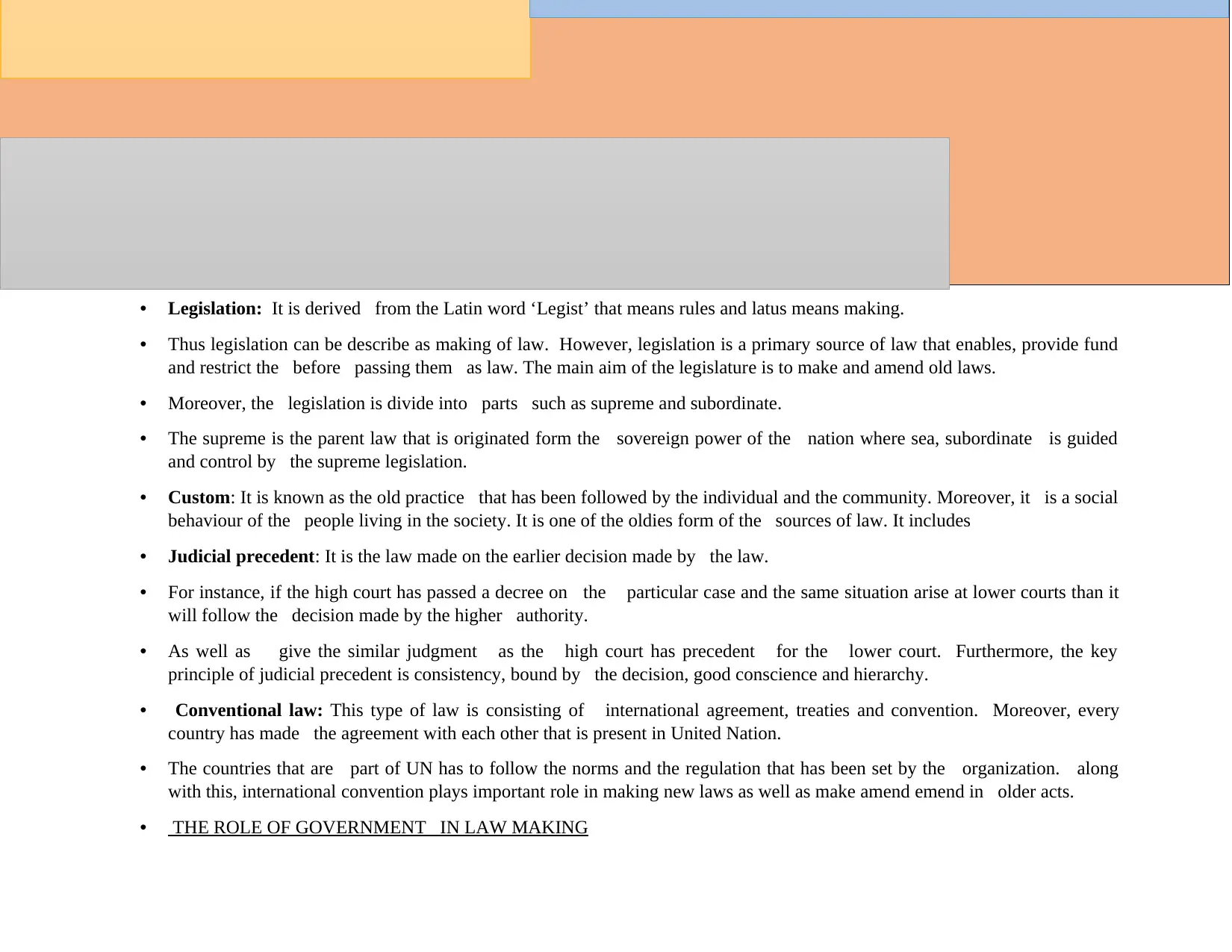
NOTES
DIFFERENT SOURCES OF LAW
• Law can be define as set of rules and regulation that are made by the government in order to maintain peace in the society.
• Moreover, law are norms that are applied by the state and central government. There are various sources of law such as
legislation, customs, Judicial precedent, conventional law and justice and equity
• Legislation: It is derived from the Latin word ‘Legist’ that means rules and latus means making.
• Thus legislation can be describe as making of law. However, legislation is a primary source of law that enables, provide fund
and restrict the before passing them as law. The main aim of the legislature is to make and amend old laws.
• Moreover, the legislation is divide into parts such as supreme and subordinate.
• The supreme is the parent law that is originated form the sovereign power of the nation where sea, subordinate is guided
and control by the supreme legislation.
• Custom: It is known as the old practice that has been followed by the individual and the community. Moreover, it is a social
behaviour of the people living in the society. It is one of the oldies form of the sources of law. It includes
• Judicial precedent: It is the law made on the earlier decision made by the law.
• For instance, if the high court has passed a decree on the particular case and the same situation arise at lower courts than it
will follow the decision made by the higher authority.
• As well as give the similar judgment as the high court has precedent for the lower court. Furthermore, the key
principle of judicial precedent is consistency, bound by the decision, good conscience and hierarchy.
• Conventional law: This type of law is consisting of international agreement, treaties and convention. Moreover, every
country has made the agreement with each other that is present in United Nation.
• The countries that are part of UN has to follow the norms and the regulation that has been set by the organization. along
with this, international convention plays important role in making new laws as well as make amend emend in older acts.
• THE ROLE OF GOVERNMENT IN LAW MAKING
DIFFERENT SOURCES OF LAW
• Law can be define as set of rules and regulation that are made by the government in order to maintain peace in the society.
• Moreover, law are norms that are applied by the state and central government. There are various sources of law such as
legislation, customs, Judicial precedent, conventional law and justice and equity
• Legislation: It is derived from the Latin word ‘Legist’ that means rules and latus means making.
• Thus legislation can be describe as making of law. However, legislation is a primary source of law that enables, provide fund
and restrict the before passing them as law. The main aim of the legislature is to make and amend old laws.
• Moreover, the legislation is divide into parts such as supreme and subordinate.
• The supreme is the parent law that is originated form the sovereign power of the nation where sea, subordinate is guided
and control by the supreme legislation.
• Custom: It is known as the old practice that has been followed by the individual and the community. Moreover, it is a social
behaviour of the people living in the society. It is one of the oldies form of the sources of law. It includes
• Judicial precedent: It is the law made on the earlier decision made by the law.
• For instance, if the high court has passed a decree on the particular case and the same situation arise at lower courts than it
will follow the decision made by the higher authority.
• As well as give the similar judgment as the high court has precedent for the lower court. Furthermore, the key
principle of judicial precedent is consistency, bound by the decision, good conscience and hierarchy.
• Conventional law: This type of law is consisting of international agreement, treaties and convention. Moreover, every
country has made the agreement with each other that is present in United Nation.
• The countries that are part of UN has to follow the norms and the regulation that has been set by the organization. along
with this, international convention plays important role in making new laws as well as make amend emend in older acts.
• THE ROLE OF GOVERNMENT IN LAW MAKING
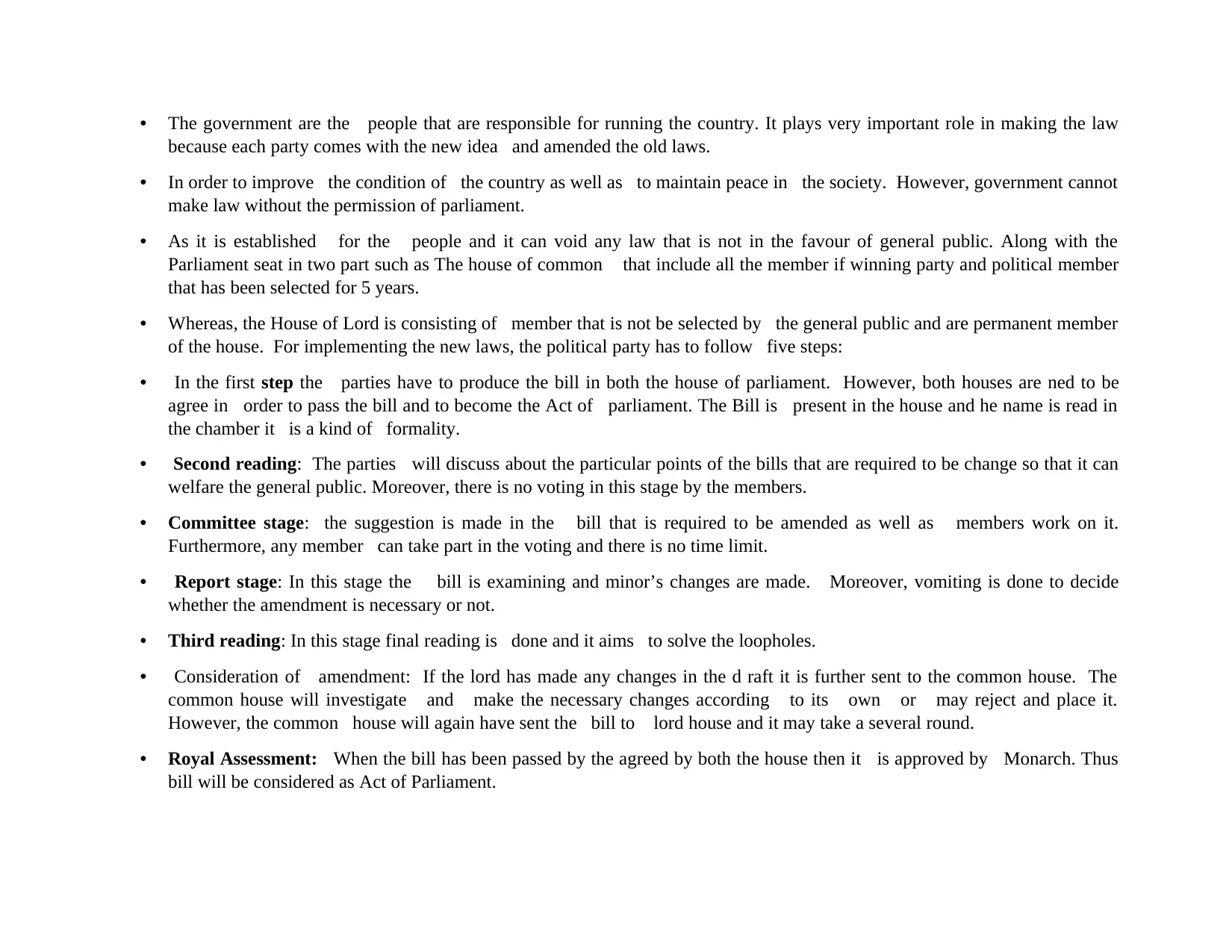
• The government are the people that are responsible for running the country. It plays very important role in making the law
because each party comes with the new idea and amended the old laws.
• In order to improve the condition of the country as well as to maintain peace in the society. However, government cannot
make law without the permission of parliament.
• As it is established for the people and it can void any law that is not in the favour of general public. Along with the
Parliament seat in two part such as The house of common that include all the member if winning party and political member
that has been selected for 5 years.
• Whereas, the House of Lord is consisting of member that is not be selected by the general public and are permanent member
of the house. For implementing the new laws, the political party has to follow five steps:
• In the first step the parties have to produce the bill in both the house of parliament. However, both houses are ned to be
agree in order to pass the bill and to become the Act of parliament. The Bill is present in the house and he name is read in
the chamber it is a kind of formality.
• Second reading: The parties will discuss about the particular points of the bills that are required to be change so that it can
welfare the general public. Moreover, there is no voting in this stage by the members.
• Committee stage: the suggestion is made in the bill that is required to be amended as well as members work on it.
Furthermore, any member can take part in the voting and there is no time limit.
• Report stage: In this stage the bill is examining and minor’s changes are made. Moreover, vomiting is done to decide
whether the amendment is necessary or not.
• Third reading: In this stage final reading is done and it aims to solve the loopholes.
• Consideration of amendment: If the lord has made any changes in the d raft it is further sent to the common house. The
common house will investigate and make the necessary changes according to its own or may reject and place it.
However, the common house will again have sent the bill to lord house and it may take a several round.
• Royal Assessment: When the bill has been passed by the agreed by both the house then it is approved by Monarch. Thus
bill will be considered as Act of Parliament.
because each party comes with the new idea and amended the old laws.
• In order to improve the condition of the country as well as to maintain peace in the society. However, government cannot
make law without the permission of parliament.
• As it is established for the people and it can void any law that is not in the favour of general public. Along with the
Parliament seat in two part such as The house of common that include all the member if winning party and political member
that has been selected for 5 years.
• Whereas, the House of Lord is consisting of member that is not be selected by the general public and are permanent member
of the house. For implementing the new laws, the political party has to follow five steps:
• In the first step the parties have to produce the bill in both the house of parliament. However, both houses are ned to be
agree in order to pass the bill and to become the Act of parliament. The Bill is present in the house and he name is read in
the chamber it is a kind of formality.
• Second reading: The parties will discuss about the particular points of the bills that are required to be change so that it can
welfare the general public. Moreover, there is no voting in this stage by the members.
• Committee stage: the suggestion is made in the bill that is required to be amended as well as members work on it.
Furthermore, any member can take part in the voting and there is no time limit.
• Report stage: In this stage the bill is examining and minor’s changes are made. Moreover, vomiting is done to decide
whether the amendment is necessary or not.
• Third reading: In this stage final reading is done and it aims to solve the loopholes.
• Consideration of amendment: If the lord has made any changes in the d raft it is further sent to the common house. The
common house will investigate and make the necessary changes according to its own or may reject and place it.
However, the common house will again have sent the bill to lord house and it may take a several round.
• Royal Assessment: When the bill has been passed by the agreed by both the house then it is approved by Monarch. Thus
bill will be considered as Act of Parliament.
⊘ This is a preview!⊘
Do you want full access?
Subscribe today to unlock all pages.

Trusted by 1+ million students worldwide
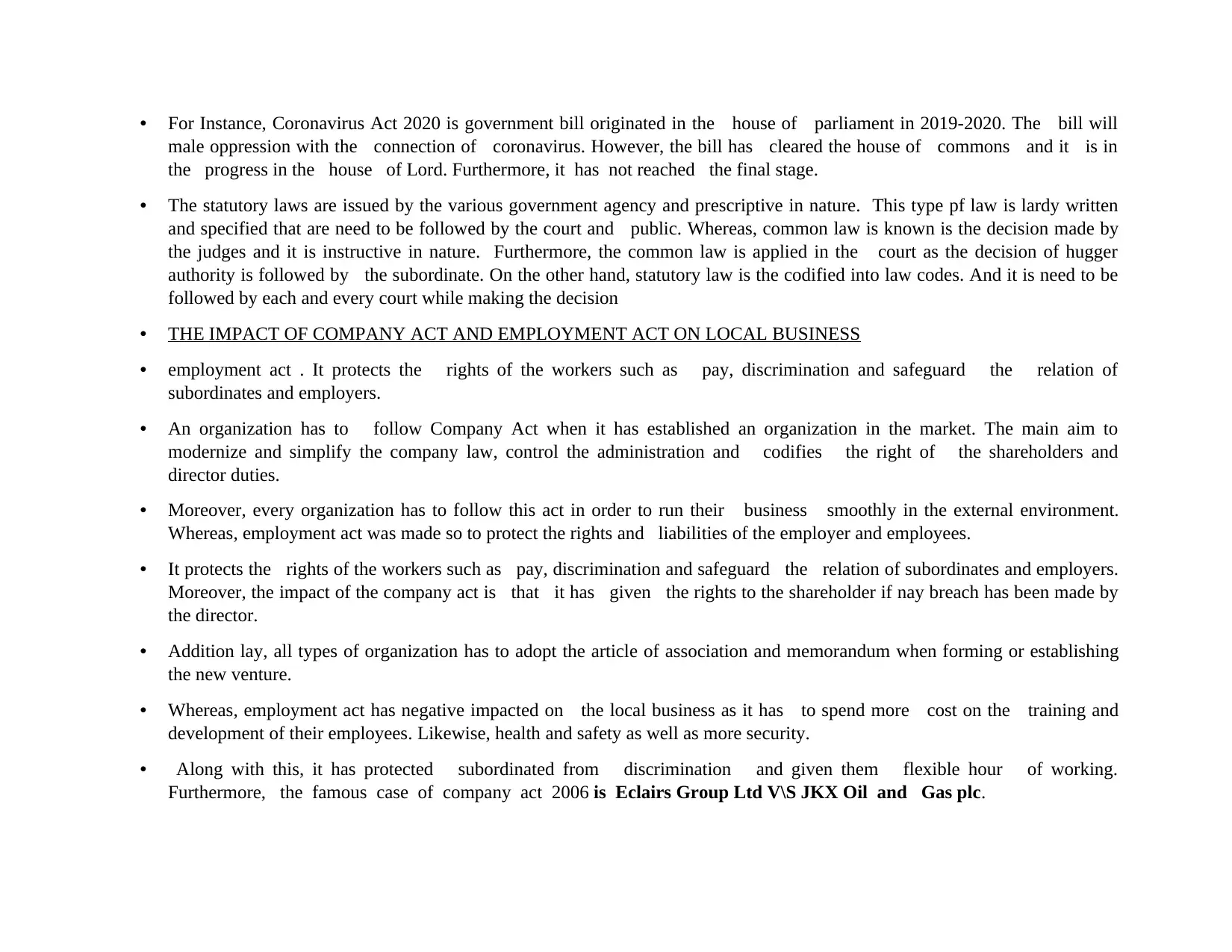
• For Instance, Coronavirus Act 2020 is government bill originated in the house of parliament in 2019-2020. The bill will
male oppression with the connection of coronavirus. However, the bill has cleared the house of commons and it is in
the progress in the house of Lord. Furthermore, it has not reached the final stage.
• The statutory laws are issued by the various government agency and prescriptive in nature. This type pf law is lardy written
and specified that are need to be followed by the court and public. Whereas, common law is known is the decision made by
the judges and it is instructive in nature. Furthermore, the common law is applied in the court as the decision of hugger
authority is followed by the subordinate. On the other hand, statutory law is the codified into law codes. And it is need to be
followed by each and every court while making the decision
• THE IMPACT OF COMPANY ACT AND EMPLOYMENT ACT ON LOCAL BUSINESS
• employment act . It protects the rights of the workers such as pay, discrimination and safeguard the relation of
subordinates and employers.
• An organization has to follow Company Act when it has established an organization in the market. The main aim to
modernize and simplify the company law, control the administration and codifies the right of the shareholders and
director duties.
• Moreover, every organization has to follow this act in order to run their business smoothly in the external environment.
Whereas, employment act was made so to protect the rights and liabilities of the employer and employees.
• It protects the rights of the workers such as pay, discrimination and safeguard the relation of subordinates and employers.
Moreover, the impact of the company act is that it has given the rights to the shareholder if nay breach has been made by
the director.
• Addition lay, all types of organization has to adopt the article of association and memorandum when forming or establishing
the new venture.
• Whereas, employment act has negative impacted on the local business as it has to spend more cost on the training and
development of their employees. Likewise, health and safety as well as more security.
• Along with this, it has protected subordinated from discrimination and given them flexible hour of working.
Furthermore, the famous case of company act 2006 is Eclairs Group Ltd V\S JKX Oil and Gas plc.
male oppression with the connection of coronavirus. However, the bill has cleared the house of commons and it is in
the progress in the house of Lord. Furthermore, it has not reached the final stage.
• The statutory laws are issued by the various government agency and prescriptive in nature. This type pf law is lardy written
and specified that are need to be followed by the court and public. Whereas, common law is known is the decision made by
the judges and it is instructive in nature. Furthermore, the common law is applied in the court as the decision of hugger
authority is followed by the subordinate. On the other hand, statutory law is the codified into law codes. And it is need to be
followed by each and every court while making the decision
• THE IMPACT OF COMPANY ACT AND EMPLOYMENT ACT ON LOCAL BUSINESS
• employment act . It protects the rights of the workers such as pay, discrimination and safeguard the relation of
subordinates and employers.
• An organization has to follow Company Act when it has established an organization in the market. The main aim to
modernize and simplify the company law, control the administration and codifies the right of the shareholders and
director duties.
• Moreover, every organization has to follow this act in order to run their business smoothly in the external environment.
Whereas, employment act was made so to protect the rights and liabilities of the employer and employees.
• It protects the rights of the workers such as pay, discrimination and safeguard the relation of subordinates and employers.
Moreover, the impact of the company act is that it has given the rights to the shareholder if nay breach has been made by
the director.
• Addition lay, all types of organization has to adopt the article of association and memorandum when forming or establishing
the new venture.
• Whereas, employment act has negative impacted on the local business as it has to spend more cost on the training and
development of their employees. Likewise, health and safety as well as more security.
• Along with this, it has protected subordinated from discrimination and given them flexible hour of working.
Furthermore, the famous case of company act 2006 is Eclairs Group Ltd V\S JKX Oil and Gas plc.
Paraphrase This Document
Need a fresh take? Get an instant paraphrase of this document with our AI Paraphraser
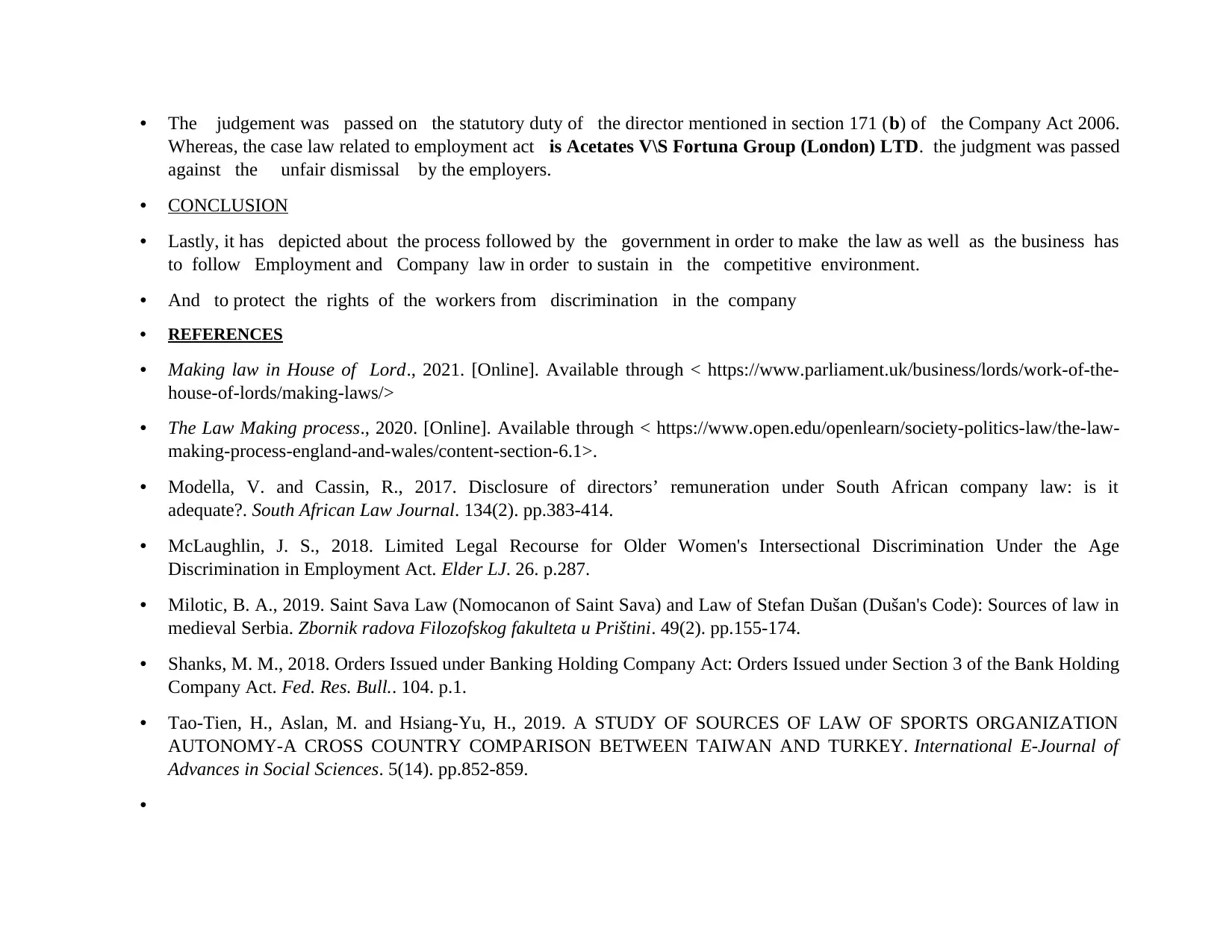
• The judgement was passed on the statutory duty of the director mentioned in section 171 (b) of the Company Act 2006.
Whereas, the case law related to employment act is Acetates V\S Fortuna Group (London) LTD. the judgment was passed
against the unfair dismissal by the employers.
• CONCLUSION
• Lastly, it has depicted about the process followed by the government in order to make the law as well as the business has
to follow Employment and Company law in order to sustain in the competitive environment.
• And to protect the rights of the workers from discrimination in the company
• REFERENCES
• Making law in House of Lord., 2021. [Online]. Available through < https://www.parliament.uk/business/lords/work-of-the-
house-of-lords/making-laws/>
• The Law Making process., 2020. [Online]. Available through < https://www.open.edu/openlearn/society-politics-law/the-law-
making-process-england-and-wales/content-section-6.1>.
• Modella, V. and Cassin, R., 2017. Disclosure of directors’ remuneration under South African company law: is it
adequate?. South African Law Journal. 134(2). pp.383-414.
• McLaughlin, J. S., 2018. Limited Legal Recourse for Older Women's Intersectional Discrimination Under the Age
Discrimination in Employment Act. Elder LJ. 26. p.287.
• Milotic, B. A., 2019. Saint Sava Law (Nomocanon of Saint Sava) and Law of Stefan Dušan (Dušan's Code): Sources of law in
medieval Serbia. Zbornik radova Filozofskog fakulteta u Prištini. 49(2). pp.155-174.
• Shanks, M. M., 2018. Orders Issued under Banking Holding Company Act: Orders Issued under Section 3 of the Bank Holding
Company Act. Fed. Res. Bull.. 104. p.1.
• Tao-Tien, H., Aslan, M. and Hsiang-Yu, H., 2019. A STUDY OF SOURCES OF LAW OF SPORTS ORGANIZATION
AUTONOMY-A CROSS COUNTRY COMPARISON BETWEEN TAIWAN AND TURKEY. International E-Journal of
Advances in Social Sciences. 5(14). pp.852-859.
•
Whereas, the case law related to employment act is Acetates V\S Fortuna Group (London) LTD. the judgment was passed
against the unfair dismissal by the employers.
• CONCLUSION
• Lastly, it has depicted about the process followed by the government in order to make the law as well as the business has
to follow Employment and Company law in order to sustain in the competitive environment.
• And to protect the rights of the workers from discrimination in the company
• REFERENCES
• Making law in House of Lord., 2021. [Online]. Available through < https://www.parliament.uk/business/lords/work-of-the-
house-of-lords/making-laws/>
• The Law Making process., 2020. [Online]. Available through < https://www.open.edu/openlearn/society-politics-law/the-law-
making-process-england-and-wales/content-section-6.1>.
• Modella, V. and Cassin, R., 2017. Disclosure of directors’ remuneration under South African company law: is it
adequate?. South African Law Journal. 134(2). pp.383-414.
• McLaughlin, J. S., 2018. Limited Legal Recourse for Older Women's Intersectional Discrimination Under the Age
Discrimination in Employment Act. Elder LJ. 26. p.287.
• Milotic, B. A., 2019. Saint Sava Law (Nomocanon of Saint Sava) and Law of Stefan Dušan (Dušan's Code): Sources of law in
medieval Serbia. Zbornik radova Filozofskog fakulteta u Prištini. 49(2). pp.155-174.
• Shanks, M. M., 2018. Orders Issued under Banking Holding Company Act: Orders Issued under Section 3 of the Bank Holding
Company Act. Fed. Res. Bull.. 104. p.1.
• Tao-Tien, H., Aslan, M. and Hsiang-Yu, H., 2019. A STUDY OF SOURCES OF LAW OF SPORTS ORGANIZATION
AUTONOMY-A CROSS COUNTRY COMPARISON BETWEEN TAIWAN AND TURKEY. International E-Journal of
Advances in Social Sciences. 5(14). pp.852-859.
•

•
⊘ This is a preview!⊘
Do you want full access?
Subscribe today to unlock all pages.

Trusted by 1+ million students worldwide

REFERENCE
Paraphrase This Document
Need a fresh take? Get an instant paraphrase of this document with our AI Paraphraser


⊘ This is a preview!⊘
Do you want full access?
Subscribe today to unlock all pages.

Trusted by 1+ million students worldwide
1 out of 9
Related Documents
Your All-in-One AI-Powered Toolkit for Academic Success.
+13062052269
info@desklib.com
Available 24*7 on WhatsApp / Email
![[object Object]](/_next/static/media/star-bottom.7253800d.svg)
Unlock your academic potential
Copyright © 2020–2026 A2Z Services. All Rights Reserved. Developed and managed by ZUCOL.





